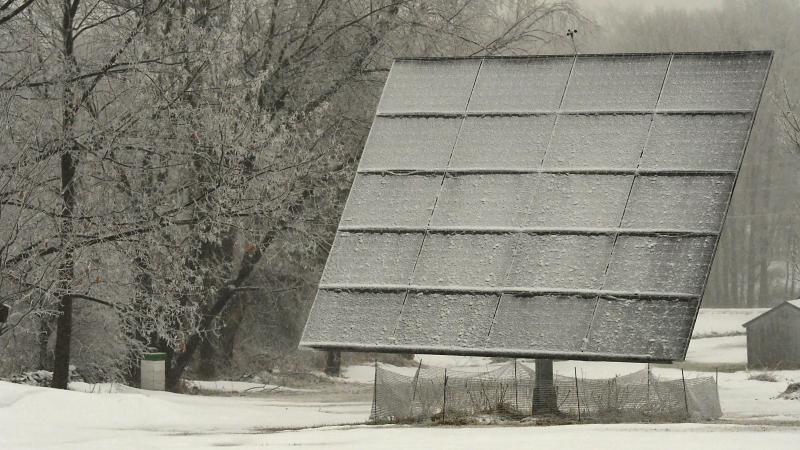Zeldin defends proposed cuts to EPA budget against bi-partisan objections during Senate hearing
The proposed cuts to EPA programs in Trump's "skinny budget" total over $4 billion. Sen. Lisa Mukowski, R-Alaska, called them "problematic," while Sen. Jeff Merkley, D-Ore., said the EPA's funding freezes since Trump took office are illegal and unconstitutional.
Environmental Protection Agency Administrator Lee Zeldin faced a bipartisan grilling this week on Capitol Hill over his proposed fiscal 2026 budget – which follows President Trump and his administration's larger agenda to reduce the size of the federal government.
Zeldin on Wednesday presented to the GOP-led Senate Appropriations Committee what's commonly referred to on Capitol Hill as a "skinny budget" – essentially a rough outline of top spending priorities without program-level details.
Among the sharpest proposed cuts is roughly $4 billion in total. The cuts apply to categorical grants, which are funds for state and local governments for specific, narrowly defined purposes. The cuts also apply to Superfund Site cleanups, environmental justice programs, revolving loan funds for drinking water and to the agency's Office of Research and Development.
However, the budget proposal includes a request for an additional $36 million for Drinking Water Programs. These are separate funding mechanisms than the revolving loan funds, but they also support water-infrastructure projects.
Exchanges were sometimes tense during Wednesday’s appropriations hearing.
Republicans raised concerns about some of the proposed cuts, and Democrats accused Zeldin of acting illegally and unconstitutionally in freezing funding that Congress had previously allocated. Unlike the proposed budget, these allocations were approved by Congress in bills that were passed and signed by the president in years past.
“Looking at some of these proposed cuts, I'm looking at them and questioning whether they are serious cuts. I find many of them problematic," said Alaska GOP Sen. Lisa Murkowski, R-Alaska, a committee member who also leads the panel's Interior, Environment, and Related Agencies Subcommittee.
No sacred cows
Zeldin said the budget proposal advances Trump’s “directive to deliver clean air, land and water for all Americans, while restoring common sense, accountability and cooperative federalism to environmental policy.”
He said that despite the changes, the EPA is continuing to fulfill its core mission of protecting human health and the environment, while relieving America of unnecessary regulatory burdens.
“We've eliminated waste and abuse in areas like the Greenhouse Gas Reduction Fund, reversed unlawful overreach like the so-called Good Neighbor rule, and begun reconsidering many overreaching rules, including power plant- and EV- related regulations that threaten grid reliability, energy affordability and consumer choice,” Zeldin said.
He also pointed out that the budget proposal calls for increases of $9 million in funding for drinking water disasters and $27 million in funding for tribes to address water infrastructure, which is the $36 million for Drinking Water Programs.
“The Trump EPA, we will not view the status quo as a sacred cow that is untouchable," Zeldin said. "We will not consider the Biden-era regulations we inherited to be etched in stone, and we absolutely refuse to waste even a penny of tax dollars under the President's leadership."
Constitutional debate
Committee member Sen. Jeff Merkley, an Oregon Democrat, began his questioning of Zeldin by stating that the Constitution grants Congress the “power of the purse.”
“Under the U.S. Constitution, the president and executive branch leaders like yourself are required to carry out those spending laws, even if you disagree with them,” he said.
Merkley then followed up by saying the EPA has “illegally and unconstitutionally impounded” approximately $24 billion, including $1.7 billion for environmental justice grants that the senator said were helping communities address pollution and reduce their use of fossil fuels by transitioning to wind and solar.
Zeldin stated he “very strongly disagreed” with the characterization that the administration freezing funds is unconstitutional.
He said when Congress appropriates funding, the previous administration might have different policy priorities. So if money, for example, goes to Alaska, the funding might include funding for programs fighting for equity or education instead of remediation. That could change, he said, when a new administration changes the priorities.
“It wasn’t the Biden administration that passed this law,” Merkley countered. “It was Congress. And so this is in the law as written and as signed by the president. And yet, you’re defying it.”
Zeldin replied that he and Merkley would just “have to disagree as strongly as possible.”
Not playing along
Merkley again stated that Zeldin was violating both the law and the Constitution. “Will you follow your oath? And if you can’t follow your oath, will you resign from office?”
Zeldin criticized Merkley for prefacing his questions by declaring actions illegal and unconstitutional.
He said it would be illegal for him to accept questionable funding under the previous administration, such as the money granted to Power Forward Communities. The nonprofit, according to the Washington Free Beacon, reported $100 in revenues in 2023. In April 2024, the organization, which was linked to perennial Georgia Democratic candidate Stacey Abrams, received a $2 billion grant under the Greenhouse Gas Reduction Fund program.
“When I see self-dealing and conflicts of interest, loading up recipients of people who are Biden officials and Obama officials and Democrat donors, when I see wording of financial agent agreements and account control agreements that tie the hands of the EPA behind its back, will I play along with that? No, absolutely not,” Zeldin said.
Republican objections to cuts
Murkowski’s scrutiny of the funding freezes was less confrontational, but she also raised concerns about it.
“I applaud the administration for seeking to find ways to help ordinary Americans cut through red tape and make programs easier to access," she said. "But the seemingly indiscriminate freezing of EPA funds, regardless of the source, has caused some significant anxiety from the folks that I’m talking to in Alaska."
She said that villages in Alaska had done extensive work to secure grant funding, only to have the grants canceled. Federal agencies receiving congressional funding, Murkowski explained, have some flexibility to reprogram and reorganize, but they must comply with requirements except in exigent circumstances. So far, she said, the EPA has not adhered to reprogrammatic guidelines.
Murkowski also asked about the Drinking Water State Revolving Fund (DWSRF), which supports revolving loan funds for water infrastructure improvement projects.
The proposed budget cuts over $2.4 billion from the program. A note included in the funding cut explains that when it comes to water infrastructure, states should be responsible for funding projects. In practice, according to the budget note, the program has been heavily earmarked by Congress for projects that are ultimately not repaid.
Zeldin said the DWSRF hasn’t been zeroed out and still contains hundreds of millions of dollars.
“I'm sure members of the House and the Senate will be having conversations amongst yourselves as to what you believe to be the appropriate funding level for SRF, as well as the future of the program, and whether or not earmarks will continue to be used to reduce that balance," he said. "That's obviously a decision that Congress has a very important role to play."
Not a binary choice
Other senators asked about how Trump’s EPA was making efforts to reduce the regulatory burden on Americans.
Sen. John Hoeven, R-N.D., talked about the decline in the reliability of the electricity grid due to the Biden administration’s “regulatory blizzard” forcing coal plants to shut down. He asked Zeldin about efforts to unwind the rules. Zeldin said that the Trump administration was protecting the environment while also allowing the economy to grow.
“It’s not a binary choice where we have to pick one or the other,” he said.
The administrator said the EPA would be rolling back many of these regulations, but it would follow the Administrative Procedures Act. The proposed rule-making would be posted for public comment periods before being finalized.
Hoeven also asked about how the EPA would make sure property rights are respected with regard to the Waters of the United States (WOTUS).
The definition of what constitutes WOTUS has changed over the years, but anything that is defined as WOTUS comes under federal regulations. In 2023, the Supreme Court ruling in Sackett v. EPA limited what can be defined as WOTUS. The Biden administration revised its definition to conform to the ruling, but critics argued it still exceeded the limitations of Sackett. Without the lack of a clear definition, landowners have faced significant fines for violating WOTUS, even though they were unaware they were doing anything wrong.
Zeldin said the EPA seeks to follow the Sackett ruling and provide a “simple, durable rule that can withstand the test of time.” The rule would be simple enough that any farmer, rancher or landowner would know if water on their land falls under WOTUS.
“I want every one of your ranchers and landowners to know whether or not there's a Water of the U.S. on their property. We owe it to them,” he said.
Zeldin faced further questions from the House Appropriations Committee on Thursday as the fiscal 2026 budget process continues.
The Facts Inside Our Reporter's Notebook
Links
- Senate Appropriations Committee hearing
- skinny budget
- Power Forward Communities
- according to the Washington Free Beacon
- Waters of the United States
- Sackett v. EPA
- revised its definition to conform to the ruling
- still exceeded the limitations of Sackett
- landowners have faced significant fines
- faces further questions















